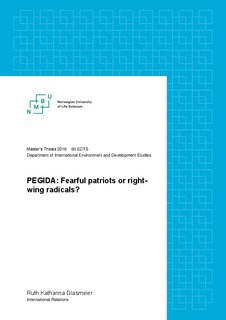| dc.description.abstract | Right-wing movements have become more popular in recent years. This shows in the increase of right-wing populist or right-wing radical parties in different European governments. Despite this European wide trend, Germany did not have a successful right-wing movement. This changed with the creation of PEGIDA and the AfD. Since this type of movement is relatively new in Germany, this thesis aims to understand PEGIDA.
The thesis aims to answer the question of Who are PEGIDA? To do so, it will focus on the reasons for people to join PEGIDA, PEGIDA’s norms and identity, their ideology and how this is comparable to other European right-wing movements, as well as the role of other European right-wing movements in the success of PEGIDA. This thesis will answer these questions through fieldwork, qualitative interviews with Edwin Wagensveld and Tommy Robinson, as well as an ideological frame analysis.
To understand the concept of right-wing movements, this thesis will look at different theories. To understand norms, identity and culture, this thesis will look at the social construction of these as well as European integration. A definition of ideology will be offered. Moreover, it aims to understand right-wing movements in general, with a special focus on right-wing populism, right-wing radicalism, and right-wing extremism. Finally, it will explain important terms when talking about protest movements in Germany.
The results show, that in its base PEGIDA appear as an anti-Islamic right-wing populist movement. The people at PEGIDA Dresden have a strong national identity and fear losing it. While these followers as well as Wagensveld and Robinson can be defined as fearful patriots, the German leadership are right-wing radicals. Interestingly, although other movements support PEGIDA, they did not play an active role in the success and development of PEGIDA. Only the Monday demonstrations of 1989 played a role in PEGIDA’s success. Besides that, while other movements focus on the dangers of Islam, PEGIDA mainly argue about the perceived failures of the government, the press, the EU, and others.
This thesis will conclude that the members of PEGIDA are a mix of fearful patriots and right-wing radicals who fight to retain their national identity against the influences of Islam and the political elites. | nb_NO |
